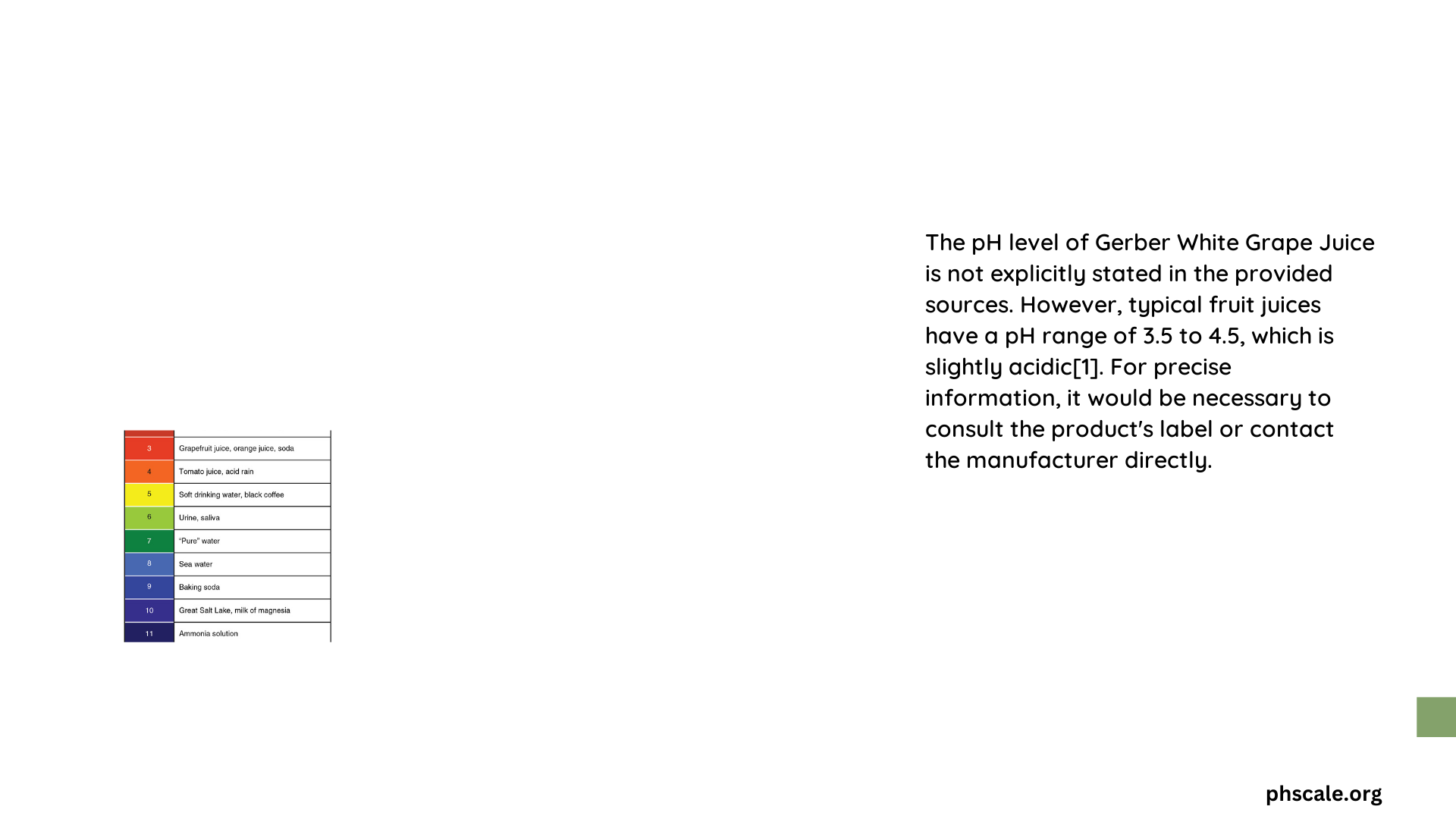Gerber white grape juice is a popular beverage choice for infants and young children. While the exact pH level of this specific product is not publicly disclosed, grape juices typically fall within a pH range of 2.9 to 3.9. This article delves into the acidity, nutritional content, and health implications of Gerber white grape juice, providing valuable insights for parents and caregivers.
What is the pH Level of Gerber White Grape Juice?
While Gerber does not explicitly state the pH level of their white grape juice, we can make an educated estimate based on general grape juice characteristics:
- Grape juices typically have a pH range of 2.9 to 3.9
- White grape juices tend to be slightly more acidic than red grape juices
- The acidity is primarily due to organic acids like tartaric acid and malic acid
Given these factors, it’s reasonable to assume that Gerber white grape juice likely falls within the lower to middle part of this pH range, possibly between 3.0 and 3.5.
How Does the Acidity of Gerber White Grape Juice Compare to Other Beverages?

To put the acidity of Gerber white grape juice into perspective, let’s compare it to other common beverages:
| Beverage | Typical pH Range |
|---|---|
| Lemon Juice | 2.0 – 2.6 |
| Cola | 2.5 – 3.5 |
| Apple Juice | 3.3 – 4.0 |
| Orange Juice | 3.3 – 4.2 |
| Milk | 6.5 – 6.7 |
| Water | 7.0 |
As we can see, Gerber white grape juice is likely more acidic than milk or water but less acidic than lemon juice. Its acidity is comparable to that of cola and other fruit juices.
What Are the Main Organic Acids in Gerber White Grape Juice?
The acidity in Gerber white grape juice primarily comes from organic acids naturally present in grapes. The main acids include:
- Tartaric acid: The predominant acid in grapes and grape products
- Malic acid: The second most abundant acid in grapes
- Citric acid: Present in smaller amounts
These acids contribute not only to the pH level but also to the flavor profile of the juice.
How Does the pH of Gerber White Grape Juice Affect Its Taste?
The pH level of Gerber white grape juice plays a crucial role in its taste:
- Lower pH (higher acidity) contributes to a tart or sour taste
- The balance of sweetness and acidity creates the characteristic grape flavor
- Acidity can enhance the perception of freshness in the juice
The slightly acidic nature of the juice helps to balance the natural sweetness of the grapes, resulting in a palatable beverage for young children.
What Are the Nutritional Benefits of Gerber White Grape Juice?
Despite its acidity, Gerber white grape juice offers several nutritional benefits:
- Vitamin C: Approximately 100% of the Daily Value (DV) per 8 oz serving
- Potassium: Around 10% of the DV per 8 oz serving
- Calories: About 130 calories per 8 oz serving
The high vitamin C content supports immune function, while potassium contributes to heart health and muscle function.
Are There Any Concerns About the Acidity of Gerber White Grape Juice?
While the acidity of Gerber white grape juice is generally safe for consumption, there are some considerations:
- Dental health: Regular consumption of acidic beverages can potentially erode tooth enamel over time
- Digestive sensitivity: Some children may experience digestive discomfort due to the acidity
- Sugar content: The natural sugars in grape juice, combined with its acidity, can contribute to tooth decay if proper dental hygiene is not maintained
How Can Parents Mitigate the Effects of Acidity in Gerber White Grape Juice?
To address potential concerns related to the acidity of Gerber white grape juice, parents can:
- Dilute the juice with water to reduce its acidity and sugar content
- Serve the juice with meals rather than between meals to minimize tooth exposure to acids
- Encourage rinsing the mouth with water after drinking the juice
- Maintain good dental hygiene practices, including regular brushing and flossing
What Role Does pH Play in the Shelf Life of Gerber White Grape Juice?
The pH level of Gerber white grape juice is important for its shelf life and safety:
- Lower pH (higher acidity) helps inhibit the growth of harmful bacteria
- Acidity acts as a natural preservative, extending the product’s shelf life
- The combination of acidity and pasteurization ensures the juice remains safe for consumption
How Does the pH of Gerber White Grape Juice Compare to Fresh Grape Juice?
The pH of Gerber white grape juice is likely similar to that of fresh grape juice:
- Fresh grape juice typically has a pH between 3.0 and 3.5
- Commercial processing may slightly alter the pH, but not significantly
- The use of concentrate in commercial juices can affect acidity, but manufacturers aim to maintain a taste similar to fresh juice
What Are the Implications of pH on the Absorption of Nutrients from Gerber White Grape Juice?
The pH level of Gerber white grape juice can influence nutrient absorption:
- Acidic environments can enhance the absorption of certain minerals, such as iron
- However, the high sugar content and lack of fiber in juice can lead to rapid absorption of sugars, potentially causing blood sugar spikes
It’s important to consider these factors when incorporating Gerber white grape juice into a child’s diet.
In conclusion, while the exact pH of Gerber white grape juice is not publicly disclosed, its acidity levels are likely similar to other grape juices. Understanding the pH and its implications can help parents make informed decisions about including this beverage in their children’s diets.
References:
1. Consumer Reports – Arsenic and Lead in Fruit Juice
2. MyFoodDiary – Nutrition Facts for Gerber White Grape Juice
3. ResearchGate – pH of Red and White Grape Juices
